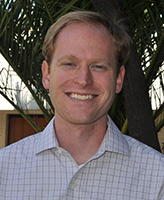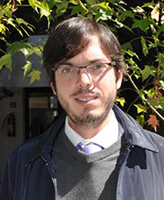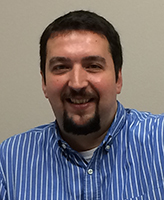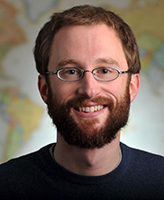From the University of Oxford to Michigan State University to University College Dublin, recent graduates of Notre Dame’s Ph.D. program in political science are landing choice positions, even in a competitive job market. In fact, the 2013-14 academic year saw record success for the program, said Professor Geoffrey Layman, director of graduate studies for the department.
“For a relatively small Ph.D. program to place eight students in tenure-track academic jobs in a single year is really remarkable,” Layman said. “That, combined with the moves of two of our very recent alumni to top universities, really shows that this is a graduate program on the rise and is a testament to the outstanding work of our faculty, our graduate students, and Christina Wolbrecht as placement director.
“Notre Dame is a great launching pad for a successful and rewarding professional career.”
Collaborative Research
 Chad Kiewiet de Jonge
Chad Kiewiet de Jonge
Chad Kiewiet de Jonge, who completed his Ph.D. in 2013, is now an assistant professor in the Political Studies Division at Centro de Investigación y Docencia Económicas (CIDE), a center of research and higher education in Mexico City. He chose Notre Dame’s graduate program, he said, because of the caliber of scholarship in the Department of Political Science.
“When I was writing my senior honors thesis at Washington and Lee University about the quality of democracy in Chile and Uruguay, I realized that many of the scholars I was citing were at Notre Dame,” he said. “So, it made sense for me to apply.”
Kiewiet de Jonge’s research examines the ways in which the attitudes and political behaviors of everyday citizens in new democracies facilitate or impede democratic consolidation. In 2014, he received the Franklin L. Burdette/Pi Sigma Alpha Award for best paper presented at the 2013 annual meeting of the American Political Science Association (APSA).
His professors at Notre Dame, he said, have always been—and continue to be—supportive of his research and his success. As a graduate student, Kiewiet de Jonge had the opportunity to coauthor papers with several faculty members.
“One thing I took away from my Ph.D. experience is that the best research is usually team-based,” he said. “While working as a team is sometimes slower, the end product is almost always substantially better. Not surprisingly, most of my publications and professional success have emerged from this collaborative approach.”
A Community of Scholars
 Ezequiel Gonzalez Ocantos
Ezequiel Gonzalez Ocantos
Ezequiel Gonzalez Ocantos, who completed his Ph.D. in 2012, joined the faculty at the University of Oxford in 2014 as an associate professor in the Department of Politics and International Relations.
Winner of APSA’s 2013 Edward S. Corwin Award for the best doctoral dissertation in the field of public law, Gonzalez Ocantos spent the first two years of his career as an assistant professor in the International Studies Division at CIDE.
His research, he said, focuses on the behavior of judicial actors in cases of state repression in Latin America. “In particular, I look at changes in the way domestic judges understand and apply international human rights law, and the impact this has on their ability to punish politicians and security officers involved in organizing and implementing repressive strategies during dictatorships and armed conflicts.
“As an Argentine citizen born in the aftermath of the last military dictatorship, I belong to the first generation in my country’s history that has never experienced the breakdown of democracy. The human rights movement that emerged as a result of the painful legacy of state terrorism has been, for many of us, one of the moral compasses in our political upbringing.”
Gonzalez Ocantos said he applied to the Ph.D. program at Notre Dame in part because he wanted to study with one of his intellectual heroes, Guillermo O’Donnell, professor emeritus of political science and founding academic director of the Kellogg Institute for International Studies.
“I also knew the department housed an impressive group of scholars interested in democracy in Latin America, including Michael Coppedge and Scott Mainwaring,” he said. “Notre Dame has a fantastic community of scholars and students. My conversations with them—both inside and outside the classroom—were the highlight of my time as a doctoral student.”
A Professional Network
 Gregory Shufeldt
Gregory Shufeldt
Gregory Shufeldt received his Ph.D. in 2014 and is now an assistant professor in the Department of Political Science at the University of Arkansas. His Ph.D. experience at Notre Dame helped him “hit the ground running,” he said.
“The Notre Dame faculty have high expectations for students in the program. Over my five years there, I came to expect the same things of myself.”
Shufeldt’s research focuses on the conceptualization, measurement, and normative implications of the quality of democracy in the American states. His current work on state politics, he said, stems from a project he began developing with another Notre Dame graduate student during his first year in the Ph.D. program.
“The best part of the program was the collegiality with faculty, staff, and other students,” Shufeldt said. “The resources and support allowed a strong camaraderie to develop between the students. We benefit professionally from one another—as coauthors, colleagues, and members of a professional network—but we also develop close, lifelong friendships.
“My success has been, in large part, because of them. For example, as part of the Rooney Center’s research workshops, I presented my research throughout my graduate program and received valuable feedback from faculty and fellow students. They were sincerely interested in making me a better political scientist.”
Training and Guidance
 Alexander Dukalskis
Alexander Dukalskis
Alexander Dukalskis, who received a Ph.D. in political science and peace studies in 2013, is now a lecturer in the School of Politics and International Relations at University College Dublin.
In his research, he explores the politics of authoritarian states, human rights, transitional justice, and Asian politics.
These research interests, he said, grew from his involvement with a non-profit organization called International Debate Education Association (IDEA). Dukalskis spent several years working in more than 20 countries in Asia, Europe, the Middle East, and Africa teaching debate and promoting it among young people as a tool to improve critical thinking and advocacy.
At Notre Dame, Dukalskis said he had an excellent experience working with faculty members in the Department of Political Science and the Kroc Institute for International Peace Studies.
“The faculty all helped prepare me for the job market and talked me through various aspects of the process at key decision points,” Dukalskis said. “Their training and guidance in the years leading up to the job market ensured that I was prepared once it became an immediate reality.”
Comprehensive Preparation
That level of support and preparation is exactly why the program has been so successful, said Wolbrecht, associate professor of political science.
“One of the things that sets our program apart is that we are very deliberate about our training,” she said. “Our students can draw from the resources of the Kaneb Center for Teaching and Learning, the professionalization workshops offered by the Graduate School, the grant support available from the Institute for Scholarship in the Liberal Arts, the workshops within our department, and the courses we offer that focus on the practical side of the profession.
“Notre Dame—at the department, College, and University levels—seeks to provide students the opportunities to develop the many qualities Ph.D. students need to succeed in an extremely competitive job market.”


